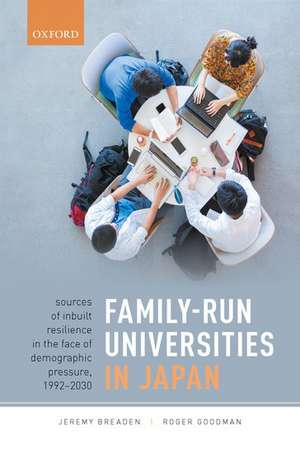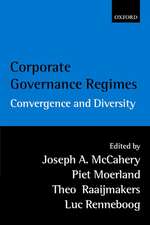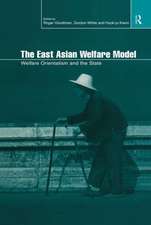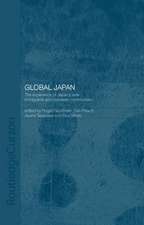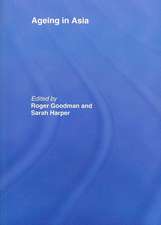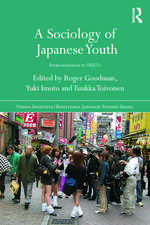Family-Run Universities in Japan: Sources of Inbuilt Resilience in the Face of Demographic Pressure, 1992-2030
Autor Jeremy Breaden, Roger Goodmanen Limba Engleză Hardback – 2 iul 2020
| Toate formatele și edițiile | Preț | Express |
|---|---|---|
| Paperback (1) | 167.50 lei 10-16 zile | +53.16 lei 10-14 zile |
| OUP OXFORD – 6 apr 2023 | 167.50 lei 10-16 zile | +53.16 lei 10-14 zile |
| Hardback (1) | 552.28 lei 31-37 zile | |
| OUP OXFORD – 2 iul 2020 | 552.28 lei 31-37 zile |
Preț: 552.28 lei
Preț vechi: 630.01 lei
-12% Nou
Puncte Express: 828
Preț estimativ în valută:
105.68€ • 110.63$ • 87.44£
105.68€ • 110.63$ • 87.44£
Carte tipărită la comandă
Livrare economică 25-31 martie
Preluare comenzi: 021 569.72.76
Specificații
ISBN-13: 9780198863496
ISBN-10: 0198863497
Pagini: 278
Dimensiuni: 160 x 234 x 21 mm
Greutate: 0.56 kg
Editura: OUP OXFORD
Colecția OUP Oxford
Locul publicării:Oxford, United Kingdom
ISBN-10: 0198863497
Pagini: 278
Dimensiuni: 160 x 234 x 21 mm
Greutate: 0.56 kg
Editura: OUP OXFORD
Colecția OUP Oxford
Locul publicării:Oxford, United Kingdom
Recenzii
Breaden and Goodman's in depth exploration of the resilience of Japanese familyrun universities in Japan offers a much needed contribution to research on this significant but hitherto understudied phenomenon. The book will be of interest to scholars and graduate students specializing in Japanese or comparative higher education as well as to university administrators themselves.
The authors give a thorough historical overview of Japanese private university management and use statistical data to get to the heart of the problem.
This book is much more than its rather prosaic title. It is a comprehensive and illuminating analysis of private higher education in Japan and worldwide, a focus on the understudied phenomenon of family-owned universities in Japan, a case study of Japanese family-owned university, and a discussion of the likely future of Japanese private higher education. All of this is cogently argued, engagingly written, and packaged into a 223 page volume.
The authors' main argument that the resilience of family-run universities plays a significant role especially in the face of the many challenges may meet the demand of family-run universities in Asia-Pacific region because the authors have successfully integrated comparative perspectives of family business both in Japan and other regions, and thus made generalization of the core concept of the strength of family-run universities, stemmed from the inbuilt resilience.
Overall, Family-Run Universities in Japan is well-written, exceptionally researched, and provides much food for thought. It offers a wealth of data, insights, and micro-level theorizations that will provide numerous jumping off points for further study in a range of different fields.
An enormously profound picture of the Japanese higher education system ... An enormous wealth of information on higher education and society in a single country -- discussed as well as being not just typical for a single country -- is well collected and convincingly presented with a lesson: a specific social phenomenon can be understood well, if one is ready for the adventure of getting to know in detail the enormous complexity of conditions.
It offers a wealth of data, insights, and micro-level theorizations that will provide numerous jumping off points for further study in a range of different fields.
The authors give a thorough historical overview of Japanese private university management and use statistical data to get to the heart of the problem.
This book is much more than its rather prosaic title. It is a comprehensive and illuminating analysis of private higher education in Japan and worldwide, a focus on the understudied phenomenon of family-owned universities in Japan, a case study of Japanese family-owned university, and a discussion of the likely future of Japanese private higher education. All of this is cogently argued, engagingly written, and packaged into a 223 page volume.
The authors' main argument that the resilience of family-run universities plays a significant role especially in the face of the many challenges may meet the demand of family-run universities in Asia-Pacific region because the authors have successfully integrated comparative perspectives of family business both in Japan and other regions, and thus made generalization of the core concept of the strength of family-run universities, stemmed from the inbuilt resilience.
Overall, Family-Run Universities in Japan is well-written, exceptionally researched, and provides much food for thought. It offers a wealth of data, insights, and micro-level theorizations that will provide numerous jumping off points for further study in a range of different fields.
An enormously profound picture of the Japanese higher education system ... An enormous wealth of information on higher education and society in a single country -- discussed as well as being not just typical for a single country -- is well collected and convincingly presented with a lesson: a specific social phenomenon can be understood well, if one is ready for the adventure of getting to know in detail the enormous complexity of conditions.
It offers a wealth of data, insights, and micro-level theorizations that will provide numerous jumping off points for further study in a range of different fields.
Notă biografică
Jeremy Breaden lectures in Japanese and Asian Studies in the School of Languages, Literatures, Cultures and Linguistics at Monash University, Australia. His research focuses on education and employment systems in contemporary Japan and East Asia. His previous works include The Organisational Dynamics of University Reform in Japan (2013) and Articulating Asia in Japanese Higher Education (2018).Roger Goodman is Nissan Professor of Japanese Studies at the University of Oxford. His previous publications include Japan's 'International Youth' (1990), Children of the Japanese State (2000), Family and Social Policy in Japan (2002), and A Sociology of Japanese Youth (2011).
